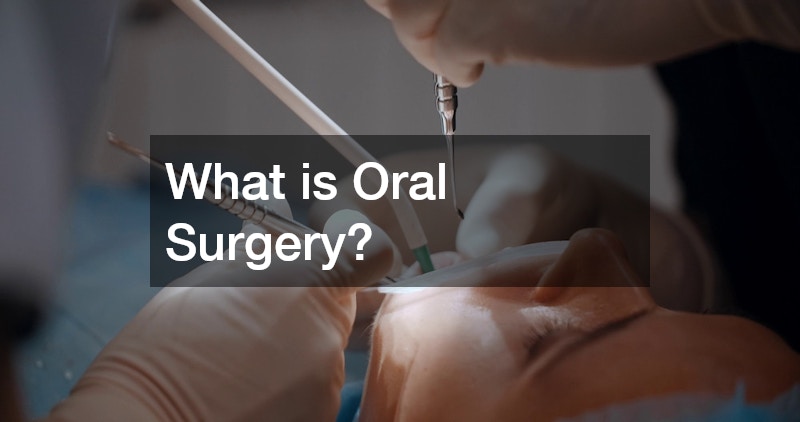
Oral surgery is a specialized branch of dentistry that focuses on diagnosing and treating conditions affecting the mouth, teeth, jaws, and facial structures. From routine tooth extractions to complex jaw reconstructions, oral surgery plays a crucial role in restoring both function and aesthetics. Understanding its procedures, preparation, and recovery helps patients feel informed and confident when facing surgical treatment.
What Are the Common Types of Oral Surgery?
Oral surgery encompasses a wide range of procedures designed to address dental and facial concerns that go beyond the scope of general dentistry.
Tooth Extraction
One of the most common oral surgery procedures, tooth extraction involves removing a damaged, decayed, or problematic tooth that cannot be saved through other treatments. Simple extractions address visible teeth, while surgical extractions may involve removing impacted or broken ones beneath the gum line.
Dental Implants
Dental implants are titanium posts surgically placed into the jawbone to replace missing teeth. Over time, the bone fuses with the implant, creating a stable base for artificial teeth, such as crowns or bridges.
Wisdom Teeth Removal
Wisdom teeth often become impacted or misaligned, causing pain, infection, or crowding. Surgical removal prevents long-term complications and preserves alignment.
Corrective Jaw Surgery
Also known as orthognathic surgery, this procedure realigns the jaws to improve chewing, speech, and appearance. It can address developmental issues, trauma, or severe bite problems.
Oral Pathology and Biopsy
When abnormal growths or lesions appear in the mouth, a biopsy helps identify potential infections, cysts, or oral cancers. Early detection through oral surgery significantly improves treatment outcomes.
How to Prepare for Oral Surgery
Proper preparation ensures a smoother procedure and recovery. Your oral surgeon will provide detailed pre-operative instructions tailored to your specific needs.
Pre-Operative Consultations
A thorough consultation includes X-rays, dental scans, and a review of your medical history. Your surgeon will discuss anesthesia options, potential risks, and the expected recovery timeline.
Fasting Guidelines
If general anesthesia or sedation is planned, patients are usually advised to avoid eating or drinking for 6–8 hours before surgery to prevent complications.
Arranging Transportation
Because anesthesia can cause drowsiness, patients should arrange for someone to drive them home after the procedure and stay with them for the first few hours.
Medication Management
Your surgeon may recommend adjusting or temporarily discontinuing certain medications, especially blood thinners, to minimize bleeding risks. Always follow your doctor’s instructions carefully.
Mental and Emotional Preparation
Feeling nervous before surgery is normal. Discuss your concerns with your oral surgeon, who can explain each step of the process and offer reassurance or sedation options to ease anxiety.
What Can Patients Expect During Recovery?
Recovery from oral surgery varies depending on the complexity of the procedure, but proper care is key to healing and comfort.
Post-Operative Care Instructions
Your surgeon will provide detailed instructions on managing bleeding, cleaning the surgical site, and when to resume normal activities. Keeping the area clean helps prevent infection and promotes healing.
Managing Pain and Swelling
Pain and swelling are common after surgery. Applying ice packs for 15-minute intervals and taking prescribed pain medication can significantly reduce discomfort.
Dietary Recommendations
Stick to soft foods such as yogurt, mashed potatoes, smoothies, and soup for the first few days. Avoid hot, crunchy, or spicy foods that can irritate the surgical site.
Signs of Complications
Watch for symptoms like prolonged bleeding, severe pain, fever, or foul odor, which may indicate infection or dry socket. Contact your oral surgeon promptly if these occur.
Follow-Up Appointments
Follow-up visits allow your surgeon to assess healing and remove stitches if necessary. These check-ins are vital to ensuring a smooth recovery and preventing complications.
Are There Risks or Complications Associated with Oral Surgery?
Like any surgical procedure, oral surgery carries certain risks, though serious complications are rare when performed by skilled professionals.
Infection Risks
Post-surgical infections can occur if bacteria enter the wound. Maintaining good oral hygiene and following aftercare instructions reduces this risk.
Nerve Damage Potential
Some procedures, especially those near the lower jaw or wisdom teeth, carry a small risk of temporary or permanent nerve irritation, which can cause numbness or tingling.
Bleeding and Clotting Issues
Minor bleeding is expected, but excessive or prolonged bleeding requires immediate medical attention.
Swelling and Bruising
Mild swelling and bruising are common and typically resolve within a few days. Ice therapy and rest can help minimize these effects.
Allergic Reactions
Allergic responses to anesthesia or medication are rare but possible. Always inform your surgeon of allergies and previous reactions.
Empowering Your Smile Through Expert Oral Surgery
Oral surgery offers solutions that go beyond aesthetics — it restores function, relieves pain, and improves overall oral health. With careful preparation, adherence to aftercare, and collaboration with a skilled oral surgeon, patients can achieve excellent results and long-term comfort. Understanding the process and maintaining open communication with your provider empowers you to approach treatment with confidence, paving the way for a stronger, healthier smile.


